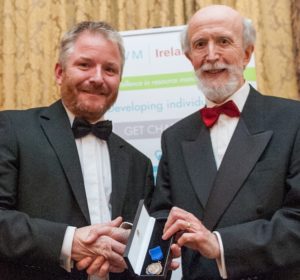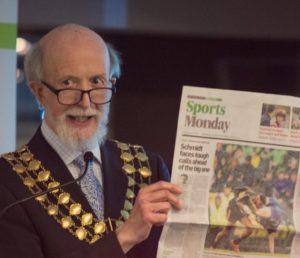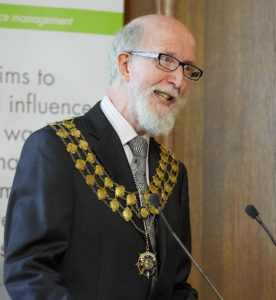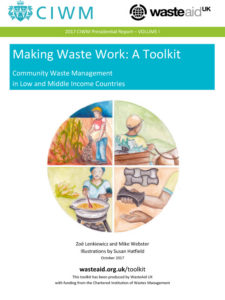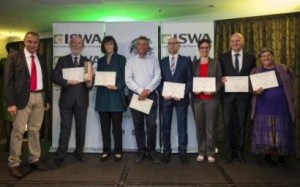Proper Waste Management in the Plastics Treaty
I am very pleased to collaborate with Tearfund to reframe the discussion around waste management in the Plastics Treaty negotiations. The Plastics Treaty is once-in-a-generation opportunity to end Plastic Pollution. We absolutely need to ‘turn off the tap’ by upstream...
Make phasing out open burning of waste an international priority
Professor David C Wilson welcomes the only waste-related official side event at COP26 which is being held in Glasgow today at 1315 and available to watch on the United Nations – Climate Change COP 26 YouTube channel. That the topic is ‘A wasted opportunity: open burning of waste causes a climate and health calamity’ is an added bonus. Congratulations to ISWA, Wasteaid, Engineering X and partners for getting both waste and open burning on the official COP26 agenda!
Nine Development Bands – a new theory of waste and development
Professor David C Wilson is pleased to co-author an important new publication The Nine Development Bands: A conceptual framework and global theory of waste and development. The open access paper in ISWA’s peer-reviewed journal Waste Management & Research can be downloaded freely. The ‘9 DBs’ builds on the integrated sustainable waste management (ISWM) analytical framework to help characterise waste and resources management (WaRM) systems in cities and countries. Based on over 100 years of combined experience of the authors (Andrew Whiteman, Mike Webster and DCW), the 9DBs is a powerful addition to the waste management practitioner’s toolkit, bringing depth and nuance to understanding of WaRM systems globally.
SDGs as Drivers of Change for Waste and Resource Management
Professor David C. Wilson has contributed a chapter on the SDGs as drivers for change to The Routledge Handbook of Waste, Resources and the Circular Economy, edited by Terry Tudor and Cleber Dutra and published on 28 December 2020. This has been a subject on which DCW has worked extensively, as re-casting improved waste and resource management as an entry point for tackling multiple, high-profile sustainable development goals significantly strengthens the case for action.
Resource and Waste Management and the SDGs
Prof David C Wilson took part in a panel discussion at the RWM with CIWM exhibition and conference at the NEC in Birmingham this week. He made the point that while we already know what needs to be done to extend municipal solid waste management services to the unserved half of the World’s population, the UN sustainable development goals (SDGs) are critical to unlocking the political will to make it happen. DCW is currently drafting a chapter on SDGs as a driver for change, for an upcoming Routledge Handbook on the circular economy.
Measuring black carbon emissions from open burning of waste
Black carbon (BC) emissions from the open burning of municipal solid wastes (MSW) and other waste types contribute significantly to global heating but are not yet included in the official (IPCC) inventory of greenhouse gases (GHGs) due to poor data availability. Natalia Reyna has just completed her PhD thesis at Imperial College London, co-supervised by Professors David C Wilson and Stephen R. Smith, with the aim of generating reliable data to plug that gap. Our second and final paper was published last week in the leading journal Atmospheric Environment, providing a reliable methodology for measuring emission factors (EFs) for black carbon from waste burning. Our best estimate of the contribution of BC from the open burning of MSW to global heating is in the range 2-10% of global CO₂Eq emissions. Given the associated air pollution and health impacts, urgent global action is essential to eliminate open burning of waste; this will provide a relatively ‘quick win’ in tackling the climate emergency. The two papers have been submitted as evidence to the IPCC sixth assessment study due to be published in 2021.
Benchmarking performance of SWM systems in East Africa
Professor David C Wilson has been working for the last two years with the Rwandan academic Telesphore Kabera to apply the Wasteaware indicators to benchmark performance of the solid waste management (SWM) and recycling system in Kigali, the capital of Rwanda. Their results form the basis of a paper published today in the first ever open access issue of the long established ISWA peer-reviewed journal Waste Management & Research. The paper uses previously unpublished results from the Wasteaware database to compare Kigali’s performance with four other East African capital cities – Dar-es-Salaam, Kampala, Nairobi and Maputo.
DCW wins 2024 ISWA Publication Award
DCW won the 2024 ISWA Publication Award for his magnum opus, looking back over his long career at the evolution of waste and resource management since the first environmental control legislation in the 1970s, and reflecting on current and future priorities.
DCW awards his Presidential Medal
DCW awarded his CIWM Presidential Medal for 2018 to Mike Webster, the founder and CEO of the new charity Wasteaid, which is working directly with local communities to tackle the global waste crisis.
DCW hands over CIWM Presidency
DCW handed over to Enda Kiernan at the Aviva Stadium in Dublin on 13th November 2018. The Gaelic Football team which Enda manages appeared in the lead photo story of the previous day’s Irish Times.
DCW inaugurated as CIWM President
Professor David C Wilson giving his inauguration speech as CIWM President 2017 at Church House Westminster in October 2017. His theme for the year was solid waste management as the forgotten utility service, underpinning modern society.
DCW’s CIWM Presidential Report 2017
DCW commissioned WasteAid UK to prepare a practical toolkit for poor communities on how to make useful products from the low-value plastics and organics in their waste. In its first year, the website was visited 56,000 times, with 7,000 downloads of the toolkit.
ISWA Publication Award 2015
DCW with co-authors Ljiljana Rodic, Andy Whiteman, Costas Velis, Barbara Oelz, Joachim Stretz and Anne Scheinberg, receiving the Award from ISWA Scientific and Technical Committee Chair Antonis Mavropoulos (left), at the ISWA 2015 World Congress in Antwerp on Tuesday 08 September.

